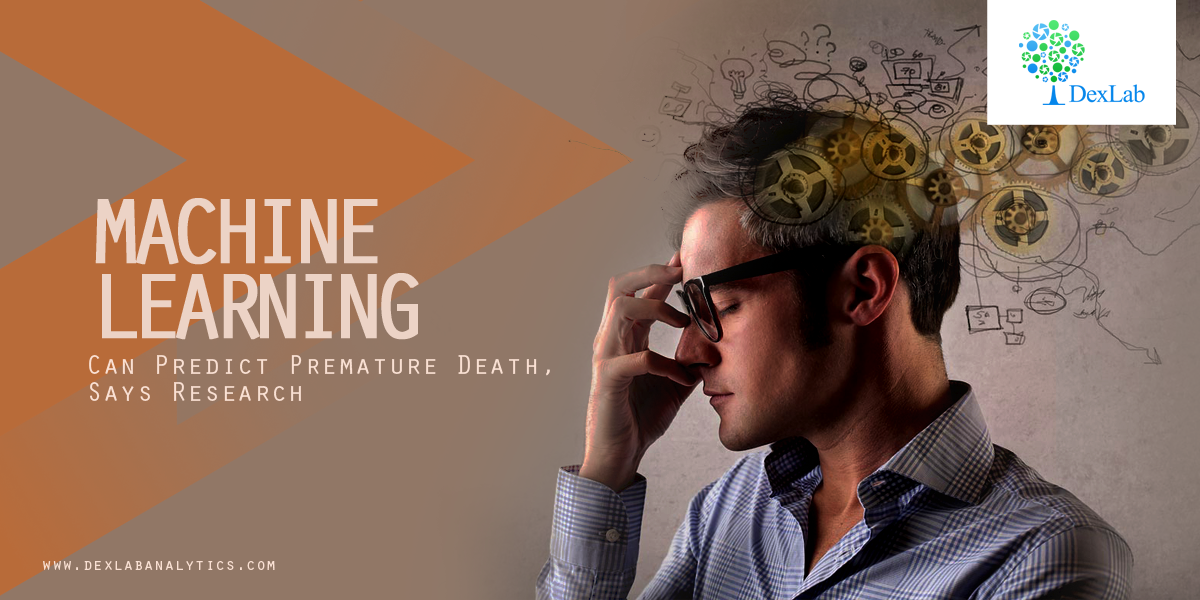
Machine Learning yet again added another feather in its cap; a team of researchers tried and tested a suave machine learning system that can now predict early death. Yes, premature death can now be estimated, courtesy a robust technology and an outstanding panel of researchers from the University of Nottingham! At first, it may sound weird and something straight out of a science fiction novel, but fret not – machine learning has proved itself in improving the status of preventive healthcare and now it’s ready to venture into new unexplored medical territories.
Prediction at Its Best
Published in PLOS ONE in one of their special editions of Machine Learning in Health and Biomedicine, the study delves into how myriad AI and ML tools can be leveraged across diverse healthcare fields. The technology of ML is already reaping benefits in cancer detection, thanks to its sophisticated quantitative power. These new age algorithms are well-equipped to predict death risks of chronic diseases way ahead of time from a widely distributed middle-aged population.
To draw clear conclusions, the team collected data of more than half a million people falling within the age group of 40 and 69 from the UK Biobank. The data collection is from the period 2006-2010, followed up till 2016. With this data in tow, the experts analyze biometric, demographic, lifestyle and clinical factors in each individual subject. Robust machine learning models are used in the process.
Adding in, the team observed dietary consumption of vegetables, fruits and meat per day of each subject. Later, the team from Nottingham University proceeded to predict the mortality of these individuals.
“We mapped the resulting predictions to mortality data from the cohort, using Office of National Statistics death records, the UK cancer registry and ‘hospital episodes’ statistics,” says Dr. Stephen Weng, assistant professor of Epidemiology and Data Science. “We found machine-learned algorithms were significantly more accurate in predicting death than the standard prediction models developed by a human expert.”
Accuracy and Outcome
The researchers involved in this ambitious project are excited to the bones. They are eager about the outcomes. They are in fact looking forward to a time where medical professionals would be able to distinguish potential health hazards in patients with on-point accuracy and evaluate the following steps that would lead the way towards prevention. “We believe that by clearly reporting these methods in a transparent way, this could help with scientific verification and future development of this exciting field for health care”, shares Dr. Stephen Weng.
As closing thoughts, the research is expected to build the foundation of enhanced medicine capabilities and deliver customized healthcare facilities tailoring risk management for each individual patient. The Nottingham research draws inspiration from a similar study where machine learning techniques were used to predict cardiovascular diseases.

In case, you are interested in Machine Learning Using Python training course, DexLab Analytics is the place to be. With a volley of in-demand skill training courses, including Python certification training and AI training, we are one of the best in town. For details, check out our official website RN.
The blog has been sourced from —
interestingengineering.com/machine-learning-algorithms-are-now-able-to-predict-premature-death
.
Machine Learning, Machine Learning Certification, Machine Learning course, Machine Learning course in Gurgaon, Machine Learning Training, Machine Learning Using Python, Python certification, python certification course, Python courses, python data science course, Python Training Institute
Comments are closed here.